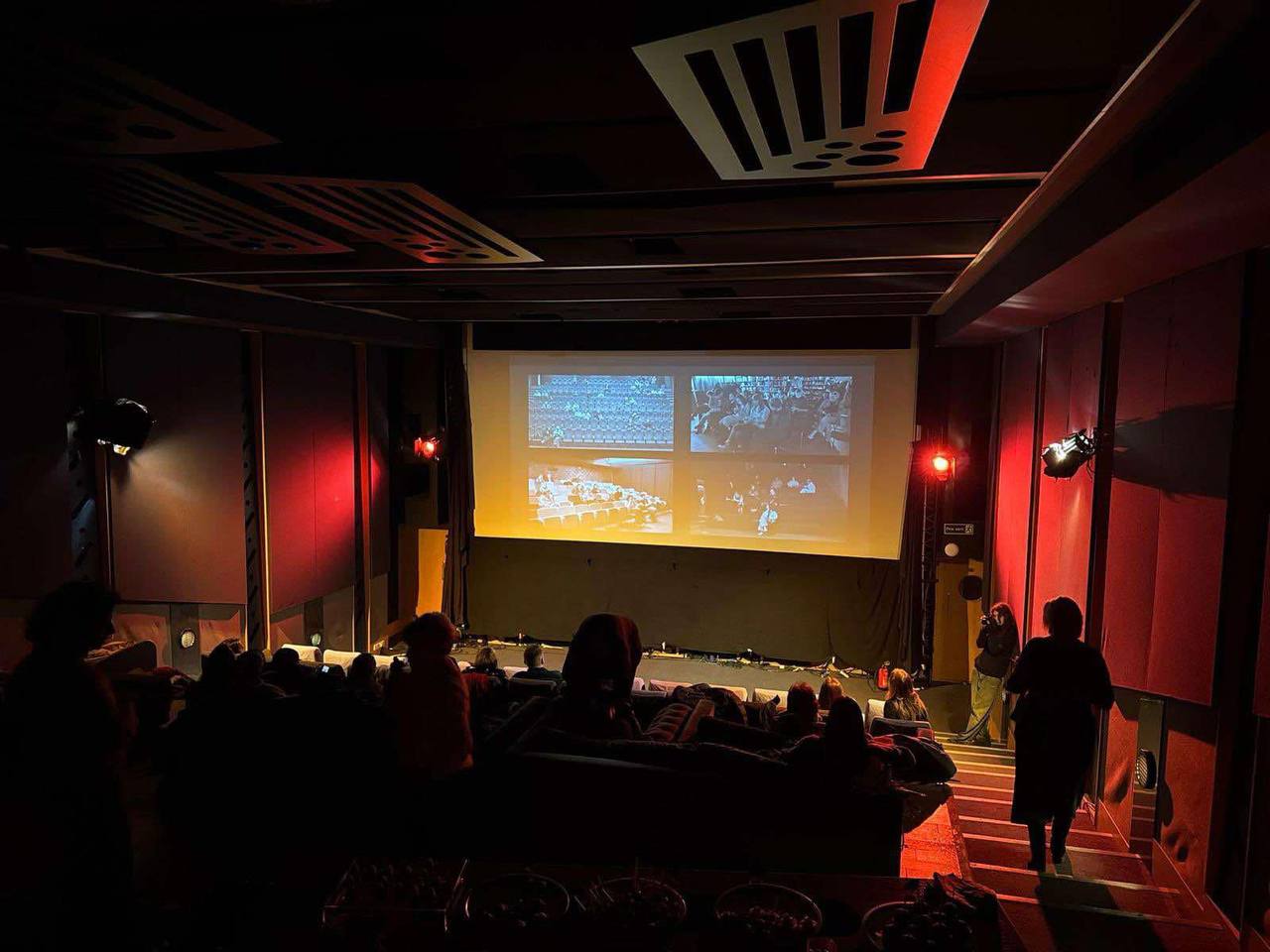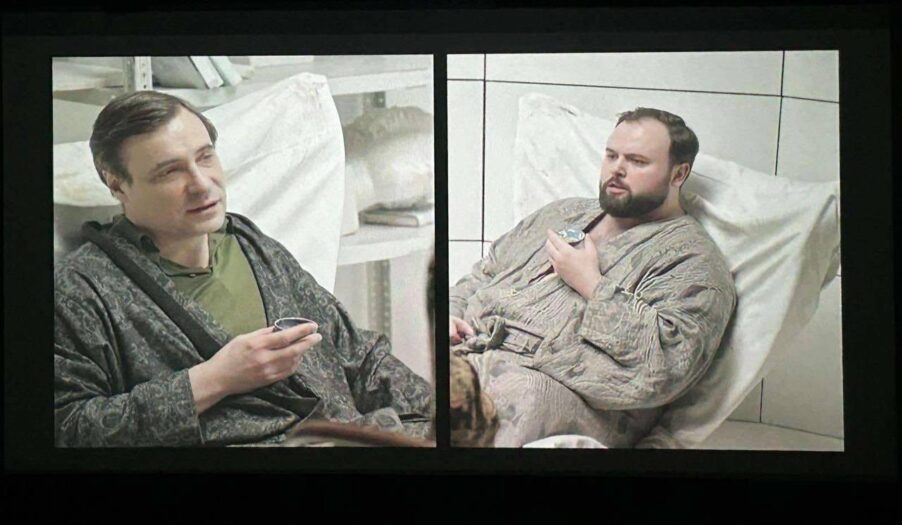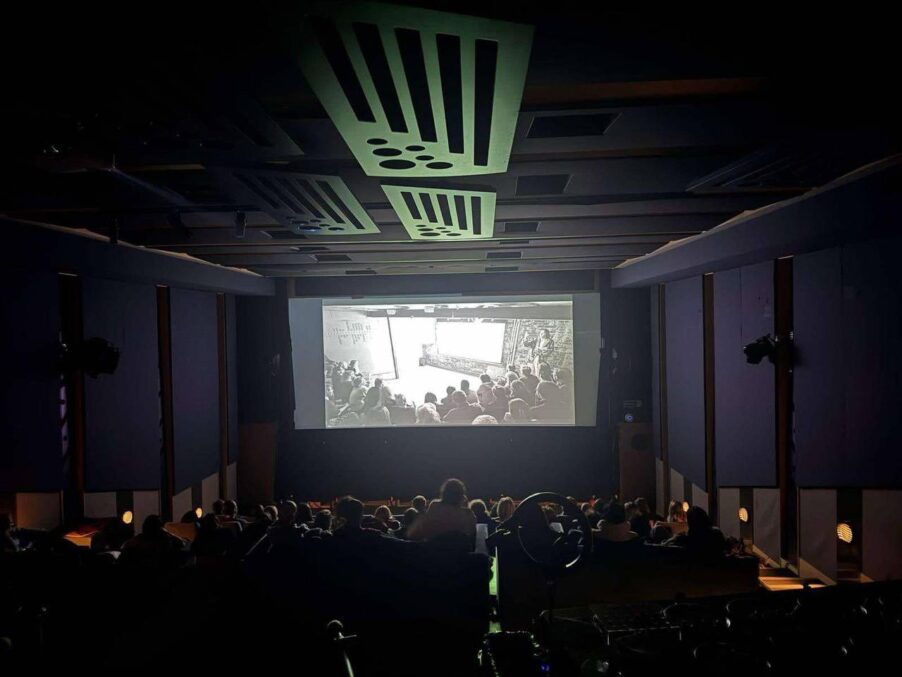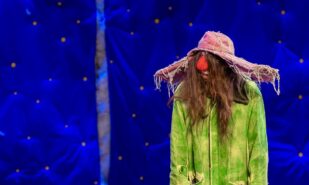A Broadcast of the Play Marble Was Shown in London
Perfect Nobodies
Joseph Brodsky wrote the play Marble in 1984 (three years before receiving the Nobel Prize). And now, in 2025, it was performed at the Brodsky Museum (the idea was conceived by Evgeny Tsyganov) on the poet’s memorial day. The play, which the audience could see only via broadcast—even if they were just behind the next wall—was staged exactly according to the playwright’s instructions. No audience, just cameras, and a conversation between two condemned men in an undefined time. Pure, unadulterated macabre.
But beyond the St. Petersburg venue, the play was also watched live in many cities, including London, where the screening was organized by Arbuzz Lectures. London’s audience gathered in the All Joy Cinema to watch the broadcast and listen to the creators of the play in a Q&A session.
So, Marble is both antiquity and science fiction at the same time: in a prison cell within a towering structure, Tullius (played by Evgeny Tsyganov himself, the ideological inspirer of this project) and Publius (Denis Saoylov) serve life sentences. They are constantly monitored by live-stream cameras. Technically, Marble seems incredibly complex. Cameras positioned in different corners of the space track the actors from point to point, seamlessly passing the image between each other without ever losing rhythm—which is crucial here. Just as many of Brodsky’s poems were written in dolnik meter, the play moves in a strictly defined manner—hence the occasional ticking of a metronome.
Publius Tullius Varro was a real Roman politician of the early 2nd century AD (and both of his sons were indeed named Publius, as the character in the play states). At times, one might think that Publius and Tullius are actually the same person—either suffering from an identity disorder in solitary confinement or completely sane and merely conversing with himself.
The two actors move slowly around a space lined with white tiles (set design by Maria Meleshko). The space is designed so cleverly, with such versatility and simplicity, that just watching the characters is a meditative experience in itself. They live their lives—taking baths (the water is so green, as if five liters of pine extract had been poured in), eating, lying on beds, undressing in front of each other without any shame. A life sentence seems to erase embarrassment and modesty. Or maybe they truly are two halves of a single whole—inseparable, fused together by the unbearable horror of their existence.
It is disgusting, funny, revolting, melancholy, and mesmerizing all at once—you simply cannot look away from these characters. You unconsciously count the possible ways the space of KV-7 (the new hall of the Brodsky Museum) can be used, listening to their voices, sometimes losing track of their petty arguments:
“Always the same. First, you killed the kitten, then the fish. Then the bunny. And now, I suppose, you’ve moved on to the canary.”
Always the same, always the same, always the sa… In the cage, the canary—a little yellow bird—suddenly transforms into a curly-haired man in a fancy jacket with a cage on his head. He is the bird now. As expected, the canary sings (the songs, inserted unexpectedly and illogically, add a sense of complete derealization to the performance).
The microphones are perfectly tuned for all three—there isn’t a single interference. The voices sound so clear, as if you could touch the sound with your fingers—it is that physically tangible. No tension, relaxed baritones, lazy answers to lazy questions.
Two “perfect nobodies”, to use Brodsky’s own terminology, talk, bicker, lazily insulting each other—philosophy intertwined with vulgarity. It lasts forever—as it should, since a life sentence is eternal. There is no rush, no purpose, no goal. Until Tullius decides to escape.
The entire cell is filled with classical white busts—these “severed heads of civilization” will aid in the escape, while only Horace and Ovid will remain. But here, those names stand for Pushkin and Brodsky themselves—and between them, an invisible assembly of poets seems to be present, from Akhmatova and Mandelstam to Blake and Lorca, whom Brodsky admired and read. A tiny Easter egg, a witty little detail. Pushkin was not allowed to travel abroad, and Brodsky was returned to his homeland—denied his escape through the “pipe to freedom.” A refined thought.
Interestingly, while Brodsky often said that there should be no intermediary between the reader and poetry, when it came to Marble, his stance was entirely different:
“I would like it to be staged in a theater or on television, not to mention radio, because this is an unusual piece for me. The only logic it follows is the logic of unbearable existence. It gets worse and worse.”
Marble is indeed an incredibly difficult play to stage. The action is not very dynamic, the text is crushingly complex, and it may even shock today’s supposedly unshockable audience (the script has been slightly shortened, by the way). And yet, paradoxically, watching this performance by Tsyganov and his extensive team (part of whom work literally behind the scenes) is remarkably easy. The text feels like prayers, the actors’ movements like those of toga-clad priests of some unknown cult. That is why this Marble draws you in, hypnotizes you, like an endless ritual from which there is no escape. That is why the escaped Tullius returns to his cell. That is why he swallows eight powerful sleeping pills at once. That is why Publius just sits beside him, making no attempt to intervene.
“A man is as lonely as a forgotten thought,” says Tullius.
And no one else says anything more.
Perhaps the play will be performed again—and honestly, that would be wonderful. A unique work, incredibly complex, terrifying, beautiful, and insane—though obviously not easy to absorb. It seems that this play can only be staged through some mystical incantation.
Dina Berdnikov, head of Arbuzz Lectures, actress, and educator, told London.Cult how the project became possible in London:
*”Zhenya and I have known each other for a long time, since we worked together—he was the director and producer of Babel, where I played all the female roles. And then, in mid-December, Zhenya called and suggested showing Marble in London as well—via a live broadcast. So we rushed to find a cinema hall. It wasn’t easy because London cinemas want to see the material before screening it, and we were saying, ‘No one has seen it at all yet.’ So, a big thank you to All Joy Cinema, who showed interest and took on our project.
And it was also amazing that today there were people in the audience studying Russian. I don’t know how they managed to comprehend such a complex text.
—As an actress, have you worked with Brodsky’s texts before?
—I’d love to, but I feel like I won’t dare for a long time, even though I adore Brodsky. I feel like many things in my life have happened because of his poetry.
—And what was it like to be the organizer and director of such an event?
—It was terrifying. First of all, we knew that 3 PM in London would be an inconvenient time, and we are incredibly grateful to everyone who made time to come. But at the same time, it was amazing that we managed to fill the hall. And when you’re the director, you’re responsible for a huge amount, but you have no control over it.
This was the peak of non-control! When I work with children, things can go wrong, but I know what to do. But here? What if the broadcast cuts out—am I supposed to start reading the play aloud myself? Of course not. Yes, the responsibility is enormous, but it’s great that we have like-minded people who find this project interesting.
And it’s important that, for the first time since COVID, we managed to reunite our team for an Arbuzz Lectures event. We really missed working together.”







